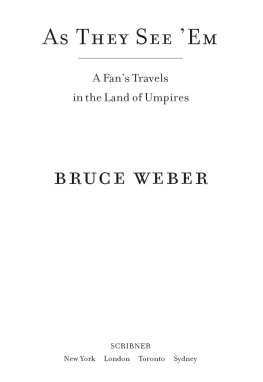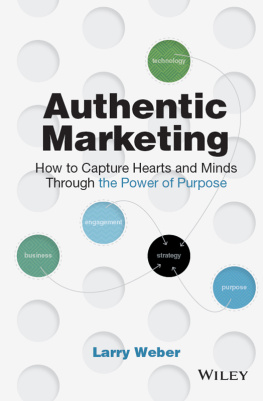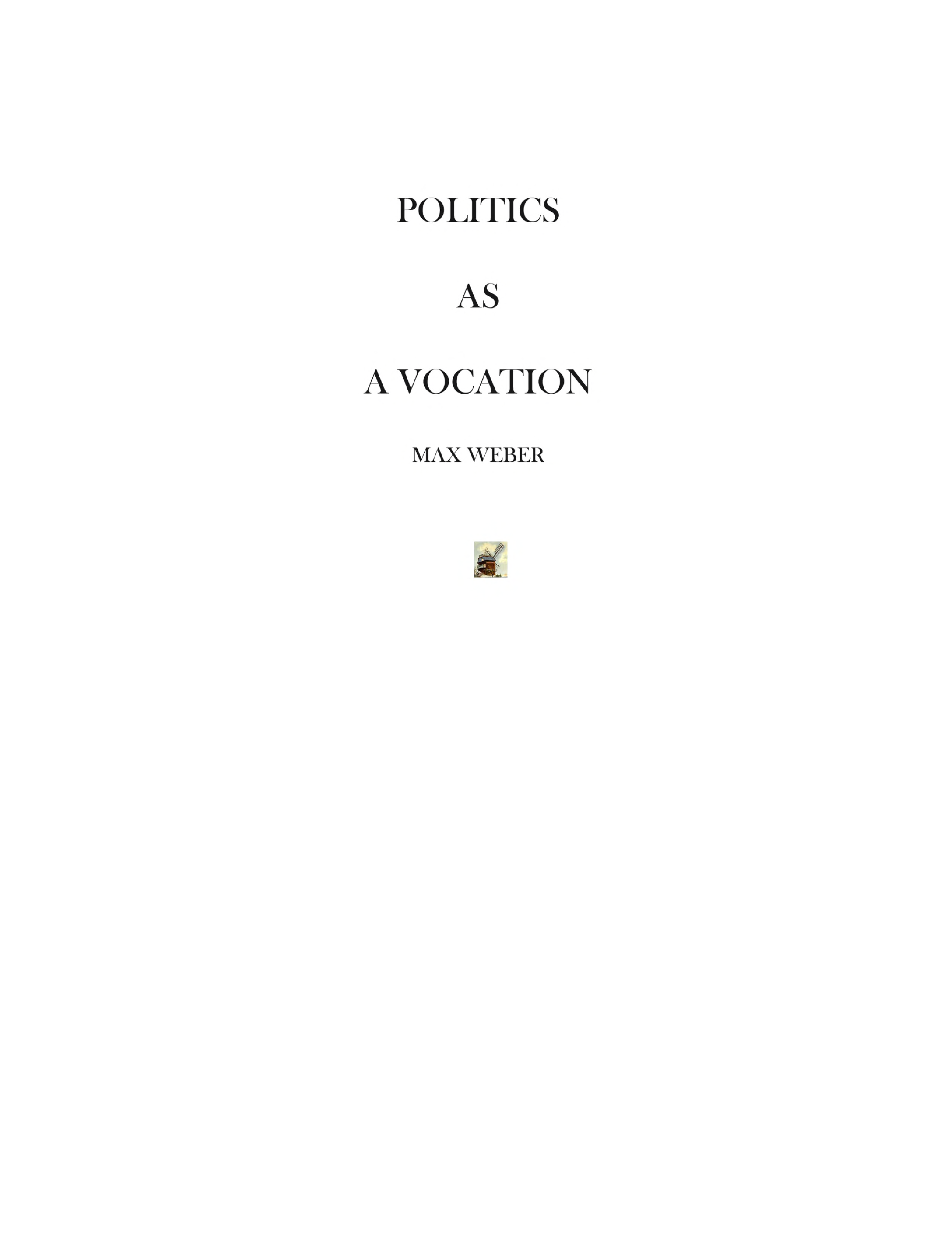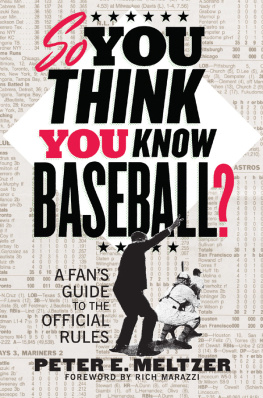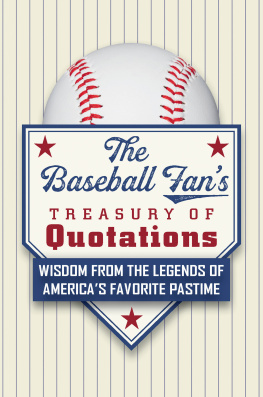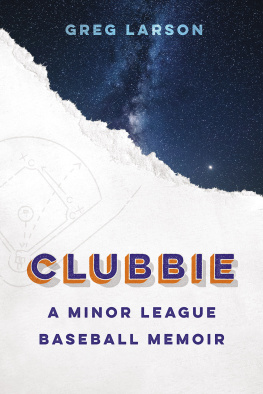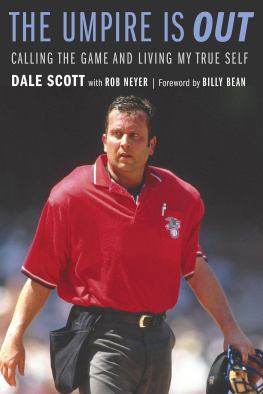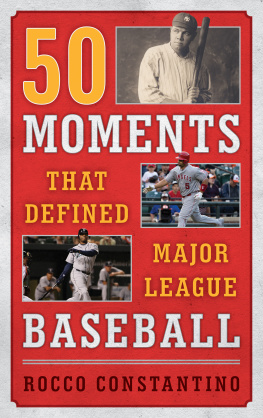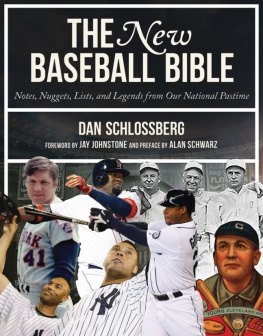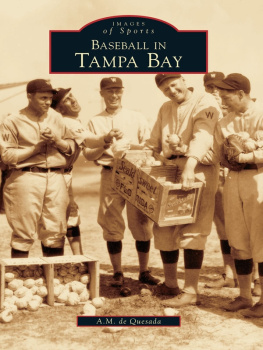ACKNOWLEDGMENTS
The entire 2006 staff of the Jim Evans Academy of Professional Umpiring deserves my thanks for putting up with a journalistic intrusion on their professional lives. Of the rosterChris Bakke, Lance Barrett, Craig Barron, Tyler Bolick, Fran Burke, Tom Clarke, Tim Daub, Shaun Francis, John Gelatt, Takashi Hirabayashi, Chris Hubler, Darren Hyman, Jason Klein, Clint Lawson, Mark Lollo, Mark Mauro, Roberto Medina, Dick Nelson, Masaki Nonaka, Brent Persinger, Brad Purdom, D. J. Reyburn, Andy Russell, Aaron Stewart, and Garrett Wilsonsome are still umpiring in the minor leagues, but most arent. They were all unfailingly helpful, however, even when they were yelling at me.
To the many umpires and baseball officials who shared their stories and opinions with me, I extend my thanks and the hope they recognize themselves in the text. Several umpires, former and current, in the major leagues and the minor leagues, who spent time with me but are not mentioned on the previous pages, should know that their contributions were substantial and necessary and that Im grateful to them: Ramon Armendariz, Brett Cavins, Marvin Hudson, Cris Jones, Jerry Layne, Jim Reynolds, and Rich Rieker.
Mike Port, Major League Baseballs vice president in charge of umpiring; Tom Leppard, director of umpire administration; and Cathy Davis, senior coordinator, handled many, many requests from me with patience and frequent, if not complete, accommodation.
Away from baseball, I had ample assistance as well. Dan Prosterman, an able young scholar, provided valuable historical research. My editor, Colin Harrison, was a reliable source of advice, tempered enthusiasm, and lunch. Oh, yeah, he also made some good suggestions about the manuscript I turned in. His assistant, Jessica Manners, handled the necessary business of being a pest on matters of book production in such a pleasant and professional way that I barely minded. An anonymous but impressively diligent copy editor launched a ferocious assault on my penchant for passive verb constructions; he or she reduced the number of awkward sentences herein by a significant percentage. My agent, Amanda Urban, a master prodder, not to mention an unflinching truth-teller, knew uncannily when to bug me and when to leave me alone.
Several friendsRick Woodward, Chris Calhoun, Amy Handelsman, Allen Steinberg, Avery Corman, and the late, alas, Walter Clarkread portions of the manuscript, offering astute (and sometimes even helpful) observations. My old pals Bill Joseph, Glenn Shambroom, and Bob Ball deserve thanks as well for no other reason than that theyre my old pals.
Im grateful to my employers at the New York Times, who agreed to hold a job open for me while I worked on the book, and then held to the bargain after I extended my absence beyond what Id anticipated. And credit (or blame) goes to Jane Karr, the editor who sent me to umpire school in the first place, unwittingly setting in motion the whole business.
Id also like to remember Lisa del Casale, who did a stranger a good turn; and (sigh) Coco, who kept the keyboard warm.
Thank you, Roie. You were there through it all.
And Id be especially remiss if I didnt thank Steve Jones and the Knickerbocker Bar and Grill, where comradeship and solace were never in short supply.
ABOUT THE AUTHOR
Bruce Weber has worked for the New York Times since 1986 as, at different times, a magazine editor, a theater critic, and a reporter. He wrote Savion! My Life in Tap, with the dancer Savion Glover, and he was the editor of the short-story anthology Look Whos Talking. He lives in Manhattan.

CONTENTS

SCRIBNER
A Division of Simon & Schuster, Inc.
1230 Avenue of the Americas
New York, NY 10020
Copyright 2009 by Bruce Weber
All rights reserved, including the right to reproduce this book or portions thereof
in any form whatsoever. For information address Scribner Subsidiary Rights Department,
1230 Avenue of the Americas, New York, NY 10020.
Grateful acknowledgment is made for permission to reprint excerpts
from the following copyrighted works: Yer Out! by Charles Ghigna and test questions
from the Jim Evans Academy of Professional Umpiring by Jim Evans
SCRIBNER and design are registered trademarks of The Gale Group, Inc.,
used under license by Simon & Schuster, Inc., the publisher of this work.
Library of Congress Control Number: 2008041641
ISBN-13: 978-1-4165-4538-5
ISBN-10: 1-4165-4538-7
Visit us on the World Wide Web:
http://www.SimonSays.com
To the memory of my parents,
and
to Robert, Lynne, and Jake
INTRODUCTION
T HE L AND OF U MPIRES
Where do you find such a man: A man involved in a game who has the authority of a sea captain, the discretion of a judge, the strength of an athlete, the eye of a hunter, the courage of a soldier, the patience of a saint and the stoicism to withstand the abuse of the grandstand, the tension of an extra-inning game, the invective of a player and the pain of a foul tip in the throat? He must be a tough character, with endurance and the ability to keep his temper and self-control, he must be unimpeachably honest, courteous, impartial, and firm, and he must compel respect from everyone!
B RANCH R ICKEY
J ust about the first thing they teach you at umpire school is how to yank your mask off without upsetting your hat. Umpires place great stock in their appearance, and if youre trying to make a call or follow a play with your hat askew or caught in your mask straps orthe worstspilled in the dirt, you look foolish, inept, exactly the image you dont want the ballplayers, the managers and coaches, or the fans to have of you.
Like everything else in umpiring, or at least in umpire instruction, the method for removing the mask is reasoned and precise. You keep your head straight, your eyes forward, and move your hand to your mask, not the other way around. The only reason you remove your mask in the first place is to watch a play on the field, and you never want to turn your eyes down, away from the play, even for a moment. Theres no worse feeling, umpires will tell you, than looking up from an instants distraction, seeing the ball on the ground, and not knowing how it got there.
Anyway, you grab the mask with your left hand, wrapping your thumb, forefinger, and middle finger around it at seven oclock. You dont use your whole hand. You cant, really, because your ball-and-strike indicator is also in the left hand, held snug against the palm by the ring finger and the pinkie. So with the three available fingers, in one swift motion you pull the mask straight out from your face to clear the bill of your cap, then straight up and off. You dont toss it aside; the catcher is the only one who ever throws a mask. If you have to come out from behind the plate and run to a spot to make a call, if you have to hold up your arms to signal foul, even if you have to use your left hand and pump hard with your elbow to sell the call that a ball was touched in fair territory, you hold your mask tight.
This is all, of course, rudimentary, something a professional umpire will do with muscle memory and a shrug, the way a concertmaster will toss off a warm-up arpeggio. But the reward is real. When you do it right, with the casual adroitness that approximates instinct, it looks both graceful and aggressive, leaving you, the plate umpire, properly possessed of the authority and dignity of your office.
Naturally, for a beginner it is a harder trick to perform than it sounds, and for me, a fifty-two-year-old student umpire, it was the first of many skills that looked simple and proved annoyingly resistant to mastery. During school drills, Id get it right a couple of times, then let my concentration slip, undoubtedly because of something else to focus on. Id come out from behind the plate to follow the path of an outfield fly ball or to straddle the third-base line to judge a line drive fair or foul, pull off the mask, and my hat would end up on the groundusually smack-dab on the baseline so it was marked with a telltale streak of limeor merely jostled and tipped crooked, the bill off-center like a rappers, or tipped forward and shading my eyes. How you can pull your mask upward and have your hat tip forward I dont know, but that it is possible I am a witness. It wasnt until school was done and I went out on the field to work an actual game and my frustration continued that I solved the problem for good (or thought I did)by buying a hat with a narrower brim. Who knew different-size baseball-cap brims even existed?

